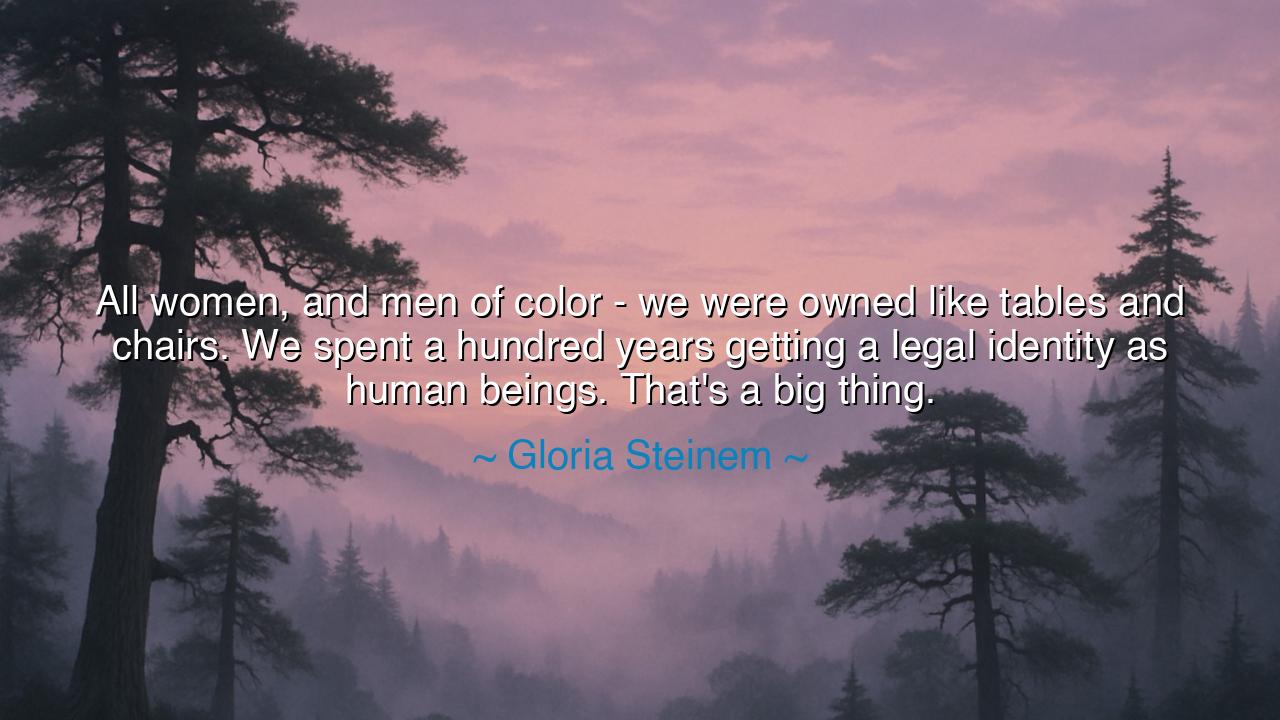
All women, and men of color - we were owned like tables and
All women, and men of color - we were owned like tables and chairs. We spent a hundred years getting a legal identity as human beings. That's a big thing.






Hearken, O seekers of wisdom, to the words of Gloria Steinem, who proclaimed with the weight of history and the fire of justice: "All women, and men of color—we were owned like tables and chairs. We spent a hundred years getting a legal identity as human beings. That's a big thing." In these words lies a profound meditation on freedom, recognition, and the long arc of human struggle, revealing that the affirmation of dignity is neither given lightly nor attained quickly, but through courage, persistence, and unyielding moral vision.
Since the dawn of civilization, societies have wrestled with the question of who counts as fully human, who may speak, own, vote, or inherit. In the courts of ancient Athens, in the halls of Rome, and across the vast empires of the East, the law often codified subjugation, treating some as property, denied voice, denied recognition. Steinem’s words echo this grim history: that for centuries, women and men of color were reduced to mere objects, their bodies, labor, and lives subject to ownership, their humanity denied by law, custom, and force.
Consider the story of the 13th Amendment in the United States, ratified in 1865, which legally abolished slavery. Though the chains were struck off, the struggle for recognition did not end. For nearly a century thereafter, African Americans labored under Jim Crow laws, disenfranchisement, and systemic oppression, while women were denied the right to vote until the 19th Amendment of 1920. Steinem’s observation that it took a hundred years to achieve legal identity as human beings reflects this prolonged struggle, this relentless pursuit of recognition and equality.
Yet the triumph of law is only part of the story. The affirmation of identity required courage, activism, and sacrifice. Figures such as Sojourner Truth, Frederick Douglass, and Susan B. Anthony embodied the struggle for legal recognition, challenging the prevailing order, speaking truth to power, and demanding that society recognize the full humanity of those it had long treated as objects. Steinem reminds us that legal identity is not an abstraction; it is the hard-won acknowledgment of dignity, the cornerstone of participation, justice, and equality.
History also shows the fragility of such achievements. Laws may declare freedom, yet social practice can lag centuries behind. Discrimination, prejudice, and violence often continue despite legal identity, demonstrating that recognition must be defended and practiced, not merely written. Steinem’s words carry a dual lesson: the attainment of rights is monumental, yet vigilance is required to ensure that women and men of color enjoy the protections and opportunities their legal identity confers.
From this reflection emerges a timeless truth: dignity and humanity are neither granted nor innate in the eyes of society—they are fought for, articulated, and affirmed through struggle. Steinem’s statement calls us to witness the long journey from ownership to recognition, to honor the sacrifices of those who labored for justice, and to understand that every right, every acknowledgment of humanity, represents both triumph and responsibility.
O seekers of wisdom, let this teaching guide your actions. Stand against oppression, recognize the humanity in all, and commit to defending the rights and dignity of those whose voices have been silenced. The legal identity of any person is both a shield and a call to action; it is proof of progress and a reminder of the vigilance required to maintain it. Steinem’s words are a beacon: the acknowledgment of human worth is monumental, hard-won, and sacred.
Take this teaching into your daily life: honor the struggles that secured legal identity, advocate for justice where it falters, and act in ways that affirm the full humanity of every individual. By doing so, you participate in the ancient and ongoing labor of civilization, ensuring that no one is treated as mere property, that the rights earned through sacrifice endure, and that society moves ever closer to the ideal of equality and respect. In this lies the enduring power of courage, justice, and moral clarity.






AAdministratorAdministrator
Welcome, honored guests. Please leave a comment, we will respond soon